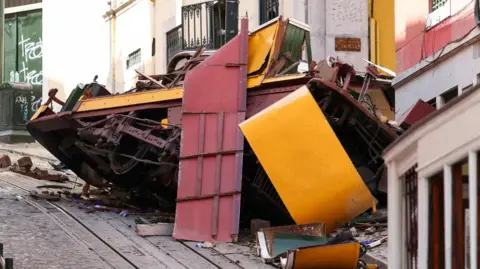As Sonia Silva prepared to leave work on Wednesday evening, she was asked by a colleague to help with a quick task. It meant she missed her regular funicular ride down the hill with her work friend on their commute home from the office in the centre of Lisbon. When she arrived at the stop a short while later, the funicular had crashed and her friend was dead. When I got there, it was a tragedy, she said.
Sixteen people were killed on Wednesday evening in Lisbon when its iconic 140-year-old Glória funicular derailed and crashed into a building. The Portuguese prime minister has described it as one of the biggest human tragedies of our recent history. Many of those killed were foreign nationals, including three British people whose identities have not yet been announced. Police say five killed were Portuguese - and four of them worked at the Santa Casa da Misericórdia charity, located at the top of the hill.
A service was held on Friday in a church next to the charity's headquarters, honouring the workers killed in the crash. The service was crowded, with people filling the aisles and any other available space.
As they left, colleagues wept and supported each other as they tried to make sense of what had happened. Several told the BBC that they regularly used the funicular as part of their commute. Sonia said she had worked at the charity for eight years and used the funicular each day. I can't express [how I feel] - it's very difficult. I am grateful but at the same time I'm very, very angry because my colleagues and lots of people died, she said.
She also reflected on the close bond she shared with her friend Sandra Coelho, who died in the crash. We'd talk about colleagues, work, everything. We'd meet in the morning and when we finished. It's very difficult because I'm not going to see her anymore, Sonia recalled through tears.
While an investigation into the cause of the crash is under way, there is speculation among mourners about overcrowding and maintenance issues that may have contributed to the tragedy. Sonia expressed her fear of using the funicular again, highlighting the collective anxiety that now shadows the beloved transport line.
Sixteen people were killed on Wednesday evening in Lisbon when its iconic 140-year-old Glória funicular derailed and crashed into a building. The Portuguese prime minister has described it as one of the biggest human tragedies of our recent history. Many of those killed were foreign nationals, including three British people whose identities have not yet been announced. Police say five killed were Portuguese - and four of them worked at the Santa Casa da Misericórdia charity, located at the top of the hill.
A service was held on Friday in a church next to the charity's headquarters, honouring the workers killed in the crash. The service was crowded, with people filling the aisles and any other available space.
As they left, colleagues wept and supported each other as they tried to make sense of what had happened. Several told the BBC that they regularly used the funicular as part of their commute. Sonia said she had worked at the charity for eight years and used the funicular each day. I can't express [how I feel] - it's very difficult. I am grateful but at the same time I'm very, very angry because my colleagues and lots of people died, she said.
She also reflected on the close bond she shared with her friend Sandra Coelho, who died in the crash. We'd talk about colleagues, work, everything. We'd meet in the morning and when we finished. It's very difficult because I'm not going to see her anymore, Sonia recalled through tears.
While an investigation into the cause of the crash is under way, there is speculation among mourners about overcrowding and maintenance issues that may have contributed to the tragedy. Sonia expressed her fear of using the funicular again, highlighting the collective anxiety that now shadows the beloved transport line.






















